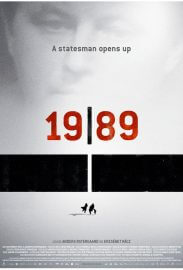
https://www.filmplatform.net/product/1989
Oscar-nominated director Anders Østergaard is best known for his ability to bring the past to life before our very eyes. In 1989, he ventures deep into the high-risk political game that led to the fall of the Berlin Wall and the reunification of Europe, revisiting the secret rooms where political battles were fought and history made. The film uses a cutting edge approach to documentary re-enactments, interwoven with testimonials and archive material to create a rich and cinematic tapestry of events.

1989 is a feature-length documentary by Oscar-nominated director Anders Østergaard, who has made it his special trend to visualize the invisible and recreate the past to make it come alive before our very eyes. The film ventures deep into the high-risk political game that lead to the fall of the Wall and the reunification of Europe by visiting the secret rooms where political battles were fought and history made. The film uses a cutting edge approach to documentary recreation, which – intervowen with testimonials and archive material – forms a rich and cinematic tapestry of events. The two central ‘witnesses’ are former Hungarian prime minister, Miklós Neméth representing the macro political level, and Gundula, the surviving half of an East German couple, who were the last to fatally attempt to cross the border, representing the micro level .
The film opens in the marshlands between Hungary and Austria. The ageing iron curtain dividing East from West, is beginning to fall apart. The barbed wire is simply rusting away and the electronical warning system, once the pride of the border troops, is getting completely unreliable. Several times a day, hundreds of troops are rushed out in their trucks as the alarm bells ring, only to realize that another rabbit or wild boar has crossed the border. The electronic fence can only be fixed with spare parts from the West, bought with the hard-currency loans that are already strangling Hungary’s frail economy. It is an absurd situation, and in Budapest, a newly appointed young prime minister, Miklos Nemeth, decides that enough is enough. Unexpected by all, this sends a ball rolling, that ten months later allows the people of Berlin to dance on the Brandenburg Gate. Before that, however, a desperate power game has taken place between the key government leaders of the time. Some of them pursued the hope for a peaceful Europe free from oppression and the nuclear menace, while others – rightfully – saw the collapse of everything they believed in, in fact the annihilation of the very states they ruled. For these men, it became – literally – a battle of life and death.
And so, the young prime minister soon learns that he has set himself up against formidable
pponents, not just the disgruntled hardliners of his own party, but also against two seasoned dictators, Nicolae Ceausescu of Romania and Erich Honecker of the GDR. In their closed circles, they make no secret of their fury and systematically plot against the traitors of the socialist cause. What goes on in their respective conference rooms behind closed doors, and also in direct confrontation with the rebellious Hungarians, is what this film – in particular – will bring to life again.
In the summer of 1989, Miklós Neméth, decides to test his opponents and allows the Hungarian/Austrian borders to be opened for some days. This leads to the Pan European Picnic – and a welcome escape for many . A young East German couple with their little son, decide that this is their chance. They abandon their apartment, work, friends and family, and travel to Hungary, , but in the meantime, the border has been closed again. During a dramatic attempt to cross the border – which just a few days earlier had been open – the young man is shot dead. Based on this tragedy, Neméth understands, that the political power games have real consequences for real people, and that he needs to act. He decides to open the borders for good.